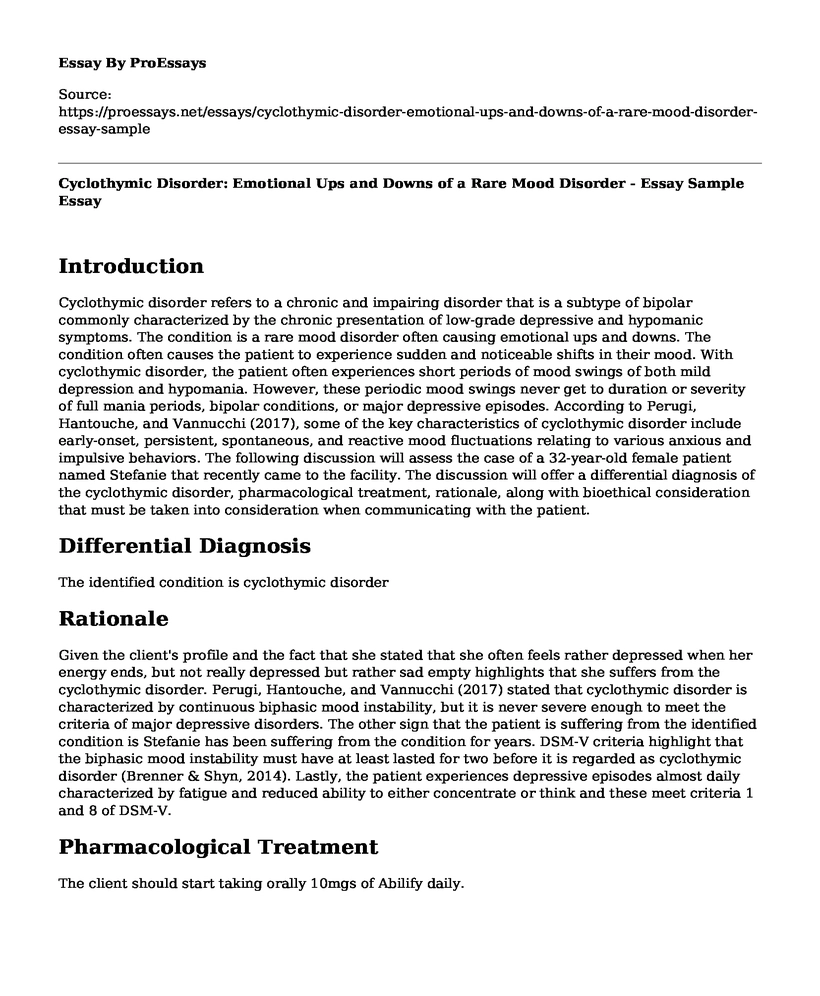Introduction
Cyclothymic disorder refers to a chronic and impairing disorder that is a subtype of bipolar commonly characterized by the chronic presentation of low-grade depressive and hypomanic symptoms. The condition is a rare mood disorder often causing emotional ups and downs. The condition often causes the patient to experience sudden and noticeable shifts in their mood. With cyclothymic disorder, the patient often experiences short periods of mood swings of both mild depression and hypomania. However, these periodic mood swings never get to duration or severity of full mania periods, bipolar conditions, or major depressive episodes. According to Perugi, Hantouche, and Vannucchi (2017), some of the key characteristics of cyclothymic disorder include early-onset, persistent, spontaneous, and reactive mood fluctuations relating to various anxious and impulsive behaviors. The following discussion will assess the case of a 32-year-old female patient named Stefanie that recently came to the facility. The discussion will offer a differential diagnosis of the cyclothymic disorder, pharmacological treatment, rationale, along with bioethical consideration that must be taken into consideration when communicating with the patient.
Differential Diagnosis
The identified condition is cyclothymic disorder
Rationale
Given the client's profile and the fact that she stated that she often feels rather depressed when her energy ends, but not really depressed but rather sad empty highlights that she suffers from the cyclothymic disorder. Perugi, Hantouche, and Vannucchi (2017) stated that cyclothymic disorder is characterized by continuous biphasic mood instability, but it is never severe enough to meet the criteria of major depressive disorders. The other sign that the patient is suffering from the identified condition is Stefanie has been suffering from the condition for years. DSM-V criteria highlight that the biphasic mood instability must have at least lasted for two before it is regarded as cyclothymic disorder (Brenner & Shyn, 2014). Lastly, the patient experiences depressive episodes almost daily characterized by fatigue and reduced ability to either concentrate or think and these meet criteria 1 and 8 of DSM-V.
Pharmacological Treatment
The client should start taking orally 10mgs of Abilify daily.
Rationale
Abilify, also commonly known as aripiprazole is an atypical antipsychotic medication used in treating various disorders such as bipolar disorder. Cyclothymia is a subtype of a bipolar that can develop into bipolar when not treated. Calabrese et al. (2018) stated that the effects of Abilify are useful in treating manic phases of a bipolar disorder but since it has minimal effect, it is essential to use it along with mood stabilizers. Besides, Muneer (2016) added that Abilify can be used in treating depressive disorder because it facilitates dopamine transmission.
Ethical Considerations That Might Affect Treatment Regimen
One of the ethical considerations that must be taken into account is autonomy. According to Richa, Chammay, Dargel, Henry, and Masson (2018) patient's autonomy must always be upheld when the healthcare team accepts the client as a unique person with the innate right to have their opinion and perspective when it comes to a choice of the treatment regimen. It then translates to the fact that the healthcare team must respect and value Stefanie's opinion, beliefs, and values when considering a treatment regimen. There is also the aspect of veracity that demands healthcare practitioners to be honest and never withhold information from the client (Richa etl., 2018). It will be essential for the doctors to not withhold any information from Stefanie and her family as this will be essential in communicating about the disorder and decision made by the patient and her family.
Conclusion
The discussion above highlights that Stefanie is suffering from the cyclothymic disorder, which is a subtype of a bipolar disorder but with a short period of mood swings associated with depression and hypomania. The best pharmacological approach of treating the identified condition is 10mgs daily of orally taken Abilify. The drug will help in managing the condition because it helps in controlling dopamine transmission relating to mood swings experienced by the patient. However, in treating the patient, it will be vital to observe ethical considerations associated with autonomy and veracity.
References
Brenner, C., & Shyn, S. (2014). Diagnosis and Management of Bipolar Disorder in Primary Care. Medical Clinics Of North America, 98(5), 1025-1048. doi: 10.1016/j.mcna.2014.06.004
Calabrese, J., Jin, N., Johnson, B., Such, P., Baker, R., & Madera, J. et al. (2018). Aripiprazole once-monthly as maintenance treatment for bipolar I disorder: a 52-week, multicenter, open-label study. International Journal Of Bipolar Disorders, 6(1). doi: 10.1186/s40345-018-0122-z
Muneer, A. (2016). The Treatment of Adult Bipolar Disorder with Aripiprazole: A Systematic Review. Cureus, 8(4), 1-26. doi: 10.7759/cureus.562
Perugi, G., Hantouche, E., & Vannucchi, G. (2017). Diagnosis and Treatment of Cyclothymia: The "Primacy" of Temperament. Current Neuropharmacology, 15(3), 372-379. doi: 10.2174/1570159x14666160616120157
Richa, S., Chammay, R., Dargel, A., Henry, C., & Masson, M. (2018). Ethical considerations in bipolar disorders. L'encephale, 44(3), 286-287. doi: 10.1016/j.encep.2017.12.005
Cite this page
Cyclothymic Disorder: Emotional Ups and Downs of a Rare Mood Disorder - Essay Sample. (2023, Mar 25). Retrieved from https://proessays.net/essays/cyclothymic-disorder-emotional-ups-and-downs-of-a-rare-mood-disorder-essay-sample
If you are the original author of this essay and no longer wish to have it published on the ProEssays website, please click below to request its removal:
- Essay Sample on Nursing and Mental Health Rotation
- Evaluation of the Severity of Depression and Anxiety Paper Example
- Discrimination and Prejudice Against the Mentally Ill People - Research Paper
- Essay Sample on Treating Unipolar Depressive Disorder: Pharmacological & Non-Pharmacological Methods
- Essay Example on Family Connections Theory: Interdependence and Emotional Strength
- Research Paper on Autism: A Complex Developmental Disorder
- Report Example on Neuroscience & Psychotherapy







